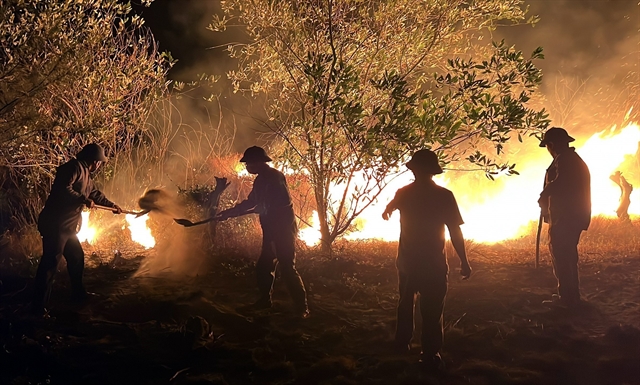 Society
Society

 |
| Soldiers work tirelessly to extinguish a forest fire caused by extreme heat in the central province of Quảng Bình in April. — VNA/VNS Photo |
HÀ NỘI — Việt Nam is likely to encounter extreme heatwaves in 2025, the National Centre for Hydro-Meteorological Forecasting (NCHMF) warned during Wednesday's conference to review 2024 activities and outline priorities for 2025.
NCHMF Director Mai Văn Khiêm described 2024 as a challenging year marked by diverse and extreme natural disasters, including drought, saltwater intrusion, severe heatwaves and widespread heavy rains.
Notably, Typhoon Yagi caused significant loss of life and damage to property.
Looking ahead, he cautioned that rising global temperatures suggest Việt Nam will likely experience intense heatwaves and scorching weather in 2025. Other expected phenomena include localised heavy rains, flash floods, landslides and an increased frequency of large storms.
In response to the growing complexity of climate change, Deputy Director of the Meteorological and Hydrological Administration Hoàng Đức Cường emphasised the need for modernisation.
"Our core approach is to provide forecasts that are earlier, more detailed, reliable, digital and visually accessible," he stated.
Cường urged the centre to adopt cutting-edge technologies, including artificial intelligence and to accelerate comprehensive digital transformation to enhance operational efficiency.
The centre is also encouraged to strengthen its role as a regional forecasting hub, improve collaboration with domestic and international partners and proactively engage in public communication before, during and after natural disasters.
Đặng Thị Hương, from the Department of Dyke Management and Natural Disaster Prevention under the Ministry of Agriculture and Rural Development, praised the centre’s timely support in forecasting Typhoon Yagi in 2024.
For 2025, she called for closer collaboration to improve the accuracy of disaster forecasts, particularly for flash floods, landslides and intense rainfall, which are crucial for reservoir management and disaster response.
In 2024, the centre effectively monitored and predicted key weather events, including nine storms, 19 heatwaves, 21 heavy rain events and 39 flash floods. Its timely forecasts supported disaster prevention, meeting national standards for accuracy and reliability.
Despite the achievements, it also faced significant challenges, including limitations in predicting super typhoon-level winds, prolonged storm durations and accurately forecasting extreme rainfall intensity and historic flood levels.
Additionally, technological setbacks, such as disruptions in the Cray XC-40 supercomputer, hindered high-resolution regional forecasting during critical periods.
Delegates at the conference exchanged insights on leveraging artificial intelligence in forecasting, refining disaster warning systems and improving inter-agency coordination.
The NCHMF committed to addressing its shortcomings and optimising its systems to better serve the nation in 2025. — VNS